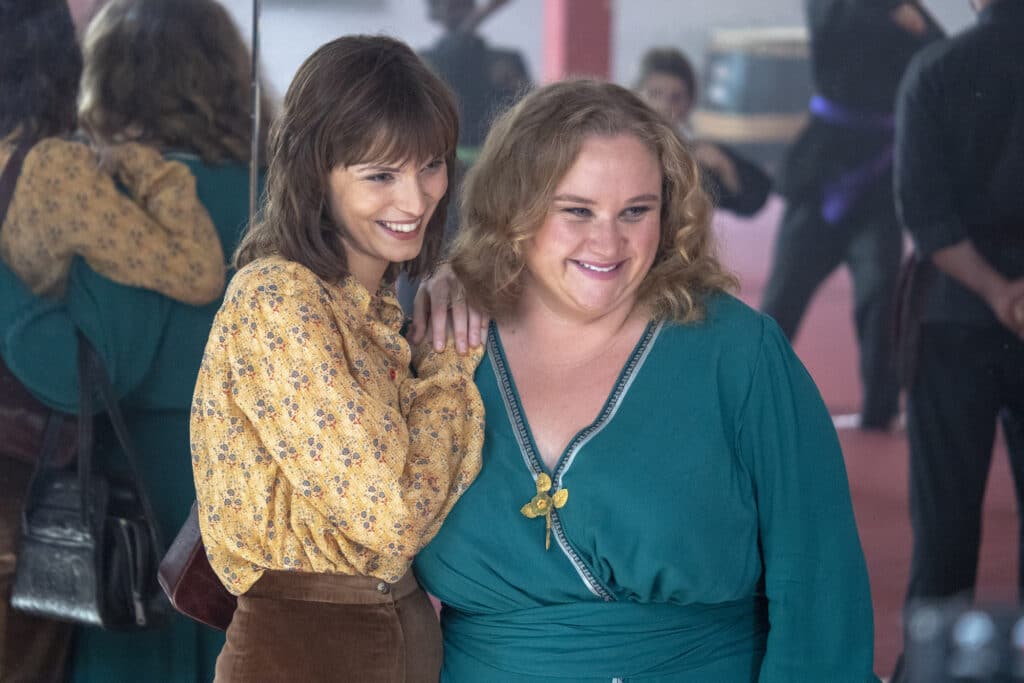Read also:
How to Watch FX Live Without CableHow To Watch AMC Without CableHow to Watch ABC Without CableHow to Watch Paramount Network Without CableThe story behind one of the most powerful feminist anthems of the ’70s gets a glossy treatment that ignores its grittier reality.
In I Am Woman, Unjoo Moon’s biopic of Australian singer and feminist Helen Reddy, the roar never really comes. For all its triumphalism, there’s not enough force behind the narrative for the successes to feel earned or impactful. As part of a recent trend of productions dealing with ERA-era feminism, I Am Woman sadly dilutes the power anthem and its context in service of making a marketable film, revealing it to be nothing more than an extension of the state of liberal feminism today.
I Am Woman tells the story of Reddy (played by Tilda Cobham-Hervey) from her early days in 1966 as an Australian immigrant living in New York through her successes as a recording artist and the voice of The Women’s Movement. Along the way, she forges a friendship with famed Rock ‘n Roll journalist Lilian Roxon (Danielle Macdonald) and stormy relationship with her husband/manager, Jeff Wald (Evan Peters). Women struggle for equality in the background.
Moon’s film wraps up the proceedings in a pretty package, but the substance and politics that gave Reddy’s song and later career such potency are reduced to set dressing. When Helen comes out of the train at the very beginning, there’s a soda ad with a pinup saying “Even I Can Open It!” Men call secretaries “sweetheart;” they state their sexism plainly. In trying to paint a picture of the pervasive patriarchy, Moon and writer Emma Jensen paint with too broad a stroke, creating impotent caricatures of the sexism women faced in the late 1960s that present no real problem for Helen to overcome.

Leaving this film, you would not call Reddy an activist. Her political expression is reduced to a few “ugh, men!”s and confident interview answers. Her characterization lacks the conviction of an activist, of someone involved. But Cobham-Hervey does what she can with what she’s given. Woman’s most welcome moments are the relaxed scenes when Helen and Lilian get to chill and be pals (though her lip-syncing would not earn her a “shantay, you stay”).
Dion Beebe’s shiny retro cinematography makes everything a little too glossy. The sexism, Evan Peters’ cocaine habit, indeed the entire 1970s are cleaned up to keep its setting palatable. Brightly lit, crisply designed, and naively smoke-free, there isn’t anything messy about the milieu. Woman feels like it’s trying to reference a rose-gold colored nostalgia rather than directly confront the decade from a more shaded perspective.
But keeping everything tidy means we lose the grit and grime of the times which gives Reddy and her work its importance. By the time we arrive at the big moment when she writes and records “I Am Woman,” we haven’t seen any cause for her to break out. All the sexism she’s confronted thus far has been so easily overcome. “I am strong. I am invincible,” she writes on a pad after tucking her daughter in for the night after a hard day of confronting strawmen. But we’ve never seen her be anything but. Far from being revolutionary, these words feel self-evident and already passé.
Keeping everything tidy means we lose the grit and grime of the times which gives Reddy and her work its importance.
“It sounds angry,” says Chris Parnell’s record producer after hearing the song for the first time. I burst out laughing. Where?! Better yet — How?! One thing you cannot say about this film is that it’s “angry.” The Helen Reddy of this film is kind, mild-mannered, and far too patient. This moment, when the dam is supposed to break for Helen and feminism, is a stunningly toothless reveal for the song that supposedly gave the feminist movement its fangs.
But I am of a generation that saw “I Am Woman” change from a power anthem to an anthem of power. I remember melting into my seat, aghast as the women of Sex and the City 2 sang it to liberate every oppressed woman in the entire Arab World. The song was far from angry. It was laughable, cringey, and embarrassing. Since its release in 1971, “I Am Woman” has become less about the song’s message and more about the ability to sing it. Those who can sing “I Am Women” are free, and those who can’t are oppressed (thus in need of American liberation).
I Am Woman contributes little to the growing list of projects looking back at the apex of second wave feminism (On the Basis of Sex, FX’s Ms. America, and Julie Taymor’s forthcoming The Glorias). Save one moment. As Jeff tries to convince the record executives to release “I Am Woman,” he argues, to Helen’s shock, that every woman marching in the streets should be considered record sales, not human beings. “The numbers are too big to ignore!” Women aren’t just angry housewives — they’re an untapped market.

That a film about this time would show the ways feminism was sold as beneficial to capitalism seems bold, because it invites us to remember that we are watching a product that has also been marketed. These recent projects, of which I Am Woman may be the weakest, want you to feel good about the ways white women have given voices to womankind the world over and opened the doors for opportunity. They don’t want you to think about the ways the goals of the women’s movement supported the rise of neoliberal capitalism or the sustaining of white supremacy in America. Instead, they provide us with abridged histories in clean and neat packaging.
In keeping the historical context and film narratives so tidy, films like I Am Woman weaken their own power. In trying to reach the broadest audience, they spread themselves too thin and become paper dolls in a grand patriarchal drama. It’s time for stronger, harsher, incomplete looks at the feminist movement of the 1970s. We “know too much to go back an’ pretend.”
I Am Woman tries to roar onto digital and on demand September 11th.